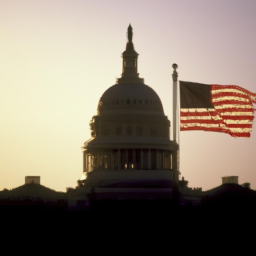The United States is once again facing a debt ceiling crisis, as a politically-divided Congress is at a crossroads over whether to raise the government's borrowing limit. Economists warn of worst-case outcomes should Congress fail to raise the debt ceiling by the "X-date" deadline, which is the date by which the U.S. Treasury Department expects to be unable to pay the government's bills without additional borrowing.
The U.S. Treasury Department reiterated on Monday that it expects to be able to pay the government's bills only through June 1 without a debt ceiling increase. This puts pressure on Congress to act quickly to avoid a default that could have serious consequences for the U.S. economy and global financial markets.
The debt ceiling is a legal limit on the amount of money that the U.S. government can borrow to finance its operations. It was first established in 1917, but it has become a contentious issue in recent years as the government's borrowing needs have increased. The debt ceiling has been raised more than 100 times since its inception, but it has become a political football in recent years as Republicans and Democrats have used it as a bargaining chip in budget negotiations.
Expanding work requirements for the largest U.S. food assistance program is still a "red line" in negotiations over raising the debt ceiling. This is a controversial issue that has been a sticking point in negotiations between Democrats and Republicans. Democrats argue that expanding work requirements will hurt low-income families and children, while Republicans argue that it will help to reduce government spending and encourage people to work.
Ordinary Americans have a tough enough time trying to get by financially each day. So why add stress to that every time the debt ceiling comes up for debate? The debt ceiling debate is a reminder of the fragility of the U.S. economy and the importance of sound fiscal policies. It is also a reminder of the importance of having a government that is able to work together to address the country's challenges.
The debt ceiling crisis is not just a problem for the U.S. government and the American people. It is also a problem for the global economy. The U.S. dollar is the world's reserve currency, and a default or downgrade of U.S. debt could have serious consequences for international financial markets. This is why Tokyo shares opened higher on Tuesday on growing hopes that Washington would avert a default, which helped push Wall Street shares higher.
But the bigger question is whether US consumers are finally running out of spending power — which perversely could boost the currency. The U.S. economy has been growing steadily in recent years, but there are concerns that the growth may be slowing down. If consumers start to cut back on spending, it could have a negative impact on the economy and the dollar.
Congress and the White House are currently negotiating over the debt ceiling, but there is still a long way to go before a deal is reached. House Minority Leader Kevin McCarthy told NBC News on Monday that "I still think we're far apart." The stakes are high, and the consequences of a failure to raise the debt ceiling could be severe. It is up to Congress and the White House to work together to find a solution that will prevent a default and protect the U.S. economy.
